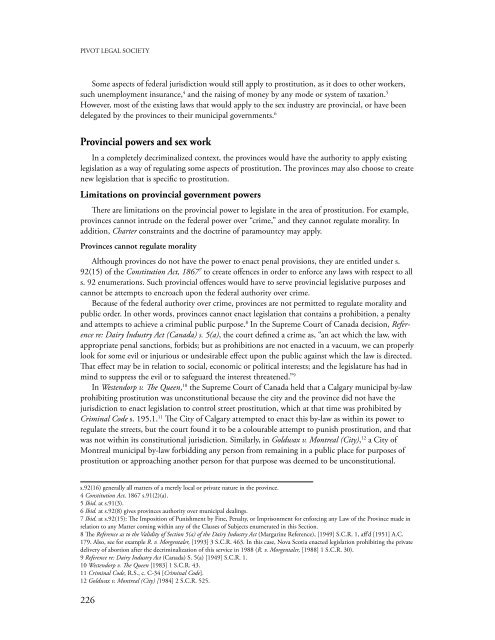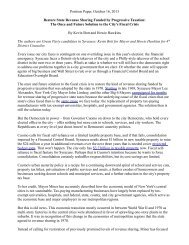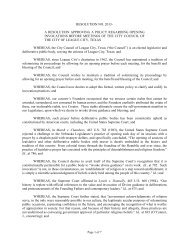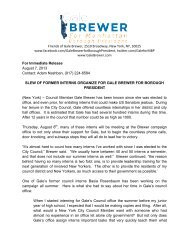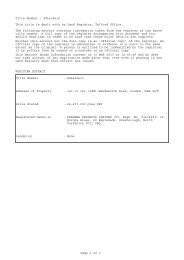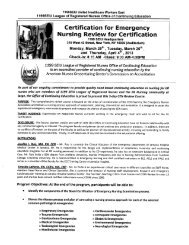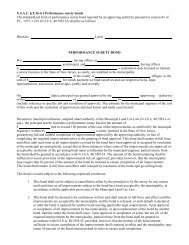Beyond Decriminalization: Sex-work, Human Rights and a New ...
Beyond Decriminalization: Sex-work, Human Rights and a New ...
Beyond Decriminalization: Sex-work, Human Rights and a New ...
- No tags were found...
You also want an ePaper? Increase the reach of your titles
YUMPU automatically turns print PDFs into web optimized ePapers that Google loves.
PIVOT LEGAL SOCIETYSome aspects of federal jurisdiction would still apply to prostitution, as it does to other <strong>work</strong>ers,such unemployment insurance, <strong>and</strong> the raising of money by any mode or system of taxation. However, most of the existing laws that would apply to the sex industry are provincial, or have beendelegated by the provinces to their municipal governments. Provincial powers <strong>and</strong> sex <strong>work</strong>In a completely decriminalized context, the provinces would have the authority to apply existinglegislation as a way of regulating some aspects of prostitution. The provinces may also choose to createnew legislation that is specific to prostitution.Limitations on provincial government powersThere are limitations on the provincial power to legislate in the area of prostitution. For example,provinces cannot intrude on the federal power over “crime,” <strong>and</strong> they cannot regulate morality. Inaddition, Charter constraints <strong>and</strong> the doctrine of paramountcy may apply.Provinces cannot regulate moralityAlthough provinces do not have the power to enact penal provisions, they are entitled under s.92(15) of the Constitution Act, 1867 to create offences in order to enforce any laws with respect to alls. 92 enumerations. Such provincial offences would have to serve provincial legislative purposes <strong>and</strong>cannot be attempts to encroach upon the federal authority over crime.Because of the federal authority over crime, provinces are not permitted to regulate morality <strong>and</strong>public order. In other words, provinces cannot enact legislation that contains a prohibition, a penalty<strong>and</strong> attempts to achieve a criminal public purpose. In the Supreme Court of Canada decision, Referencere: Dairy Industry Act (Canada) s. 5(a), the court defined a crime as, “an act which the law, withappropriate penal sanctions, forbids; but as prohibitions are not enacted in a vacuum, we can properlylook for some evil or injurious or undesirable effect upon the public against which the law is directed.That effect may be in relation to social, economic or political interests; <strong>and</strong> the legislature has had inmind to suppress the evil or to safeguard the interest threatened.” In Westendorp v. The Queen, 10 the Supreme Court of Canada held that a Calgary municipal by-lawprohibiting prostitution was unconstitutional because the city <strong>and</strong> the province did not have thejurisdiction to enact legislation to control street prostitution, which at that time was prohibited byCriminal Code s. 195.1. 11 The City of Calgary attempted to enact this by-law as within its power toregulate the streets, but the court found it to be a colourable attempt to punish prostitution, <strong>and</strong> thatwas not within its constitutional jurisdiction. Similarly, in Goldwax v. Montreal (City), 12 a City ofMontreal municipal by-law forbidding any person from remaining in a public place for purposes ofprostitution or approaching another person for that purpose was deemed to be unconstitutional.s.92(16) generally all matters of a merely local or private nature in the province. Constitution Act, 1867 s.91(2)(a). Ibid. at s.91(3). Ibid. at s.92(8) gives provinces authority over municipal dealings. Ibid. at s.92(15): The Imposition of Punishment by Fine, Penalty, or Imprisonment for enforcing any Law of the Province made inrelation to any Matter coming within any of the Classes of Subjects enumerated in this Section. The Reference as to the Validity of Section 5(a) of the Dairy Industry Act (Margarine Reference), [1949] S.C.R. 1, aff’d [1951] A.C.179. Also, see for example R. v. Morgentaler, [1993] 3 S.C.R. 463. In this case, Nova Scotia enacted legislation prohibiting the privatedelivery of abortion after the decriminalization of this service in 1988 (R. v. Morgentaler, [1988] 1 S.C.R. 30). Reference re: Dairy Industry Act (Canada) S. 5(a) [1949] S.C.R. 1.10 Westendorp v. The Queen [1983] 1 S.C.R. 43.11 Criminal Code, R.S., c. C-34 [Criminal Code].12 Goldwax v. Montreal (City) [1984] 2 S.C.R. 525.226


